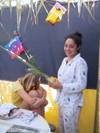Be Happy, It's Sukkot!
 Tonight begins the Festival of Sukkot, one of Judaism’s three harvest festivals. Sukkot includes one of my favorite commandments: "you shall rejoice seven days before the Lord your God."
Tonight begins the Festival of Sukkot, one of Judaism’s three harvest festivals. Sukkot includes one of my favorite commandments: "you shall rejoice seven days before the Lord your God."
Every holiday has its theme. Passover is "zeman cheruteinu," the season of our liberation, Shavuot is "zeman matan Torahteinu," the season of the giving of our Torah. But Sukkot is the only one called "zeman simchateinu," the season of our rejoicing.
It’s clear why this was a time of rejoicing in ancient Israel: the hard work of the harvest was done, people could relax, the storehouses were full so it was a time of material plenty, the weather was pleasant — life doesn’t get much better. The Talmud says anyone who has not seen the rejoicing of the Water Drawing Festival at Sukkot has never seen rejoicing in his day. There were legions of people playing music and singing, people staying up all night partying. Rabban Gamliel in the Talmud normally comes across as your typical staid rabbi — yet the Talmud tells us that on Sukkot he would juggle eight lighted torches! Other rabbis juggled glasses of wine, knives (don’t try this at home) or eggs. The rabbis provided entertainment!
Most of us aren’t farmers, so we don’t have visceral connection to the season as a time of good fortune. But we do have spiritual good fortune at this time of year. Rosh Hashana and Yom Kippur are past — having spent all that time in prayer and reflection, we know that our sins have been forgiven, and we have drawn closer to God. And the joy of being in God’s presence is at the heart of the holiday of Sukkot. As Velveteen Rabbit quotes the Me’or Eynayim, "God created the world in order to reveal God’s love to all creatures. "Before the creation of the world there was no container for the love; it was above any container and beyond comprehension.""
Sukkot reminds us that the whole world is the container for God’s love. We don’t need a fancy synagogue; our comfortable homes, in fact can sometimes be a barrier to feeling God’s love. We get out into our Sukkah, we get in closer touch with nature, we better appreciate God’s sheltering presence instead of the presence of dry wall. In fact sitting in the Sukkah is one mitzvah where the entire mitzvah surrounds you — we sit in the mitzvah and remind ourselves that God’s sheltering presence travels with us, whereever we may go.
Have a wonderful and joyous holiday of Sukkot…Chag Sameach! And remember — it’s a commandment to be happy this week!
Reb Barry

Thanks for linking to my post on the Me’or Eynayim.
Chag sameach!